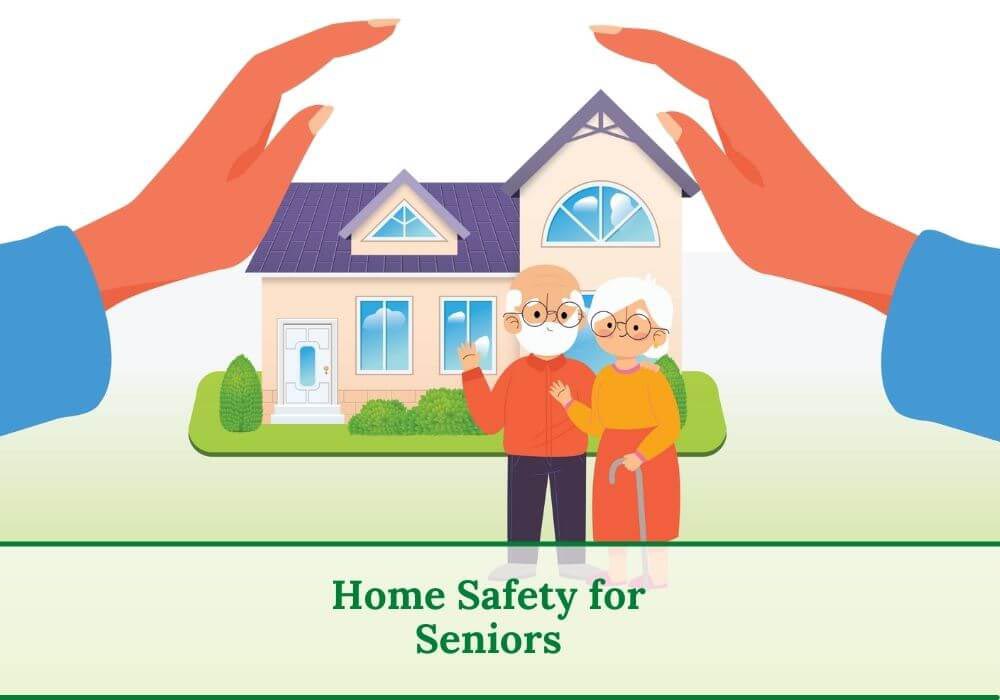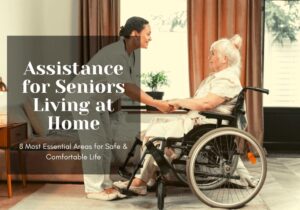
It’s no secret that as we age, our physical abilities start to decline. This can make performing everyday tasks a challenge, including staying safe at home. According to the National Institute on Aging, home safety is one of the leading concerns for seniors. In this article, I’ll go through home safety for seniors, which is a major concern in ensuring that older persons are protected against potentially hazardous situations.
Let’s find out what are the hazardous areas at home for the elderly first. Then we will go through some tips on home safety for seniors.
- Hazardous areas at home for the elderly
- Tips on bathroom safety for seniors
- Tips on kitchen safety for seniors
- Tips on bedroom safety for seniors
- Tips on stair safety for seniors
- Lighting tips for home safety
- How to Prevent Fire and Related Dangers at Home?
- Which emergency phone numbers need to be handy and visible?
- List of some home safety products
Hazardous areas at home for the elderly:
- The bathroom: Wet floors, slippery surfaces, and sharp edges in the bathtub or shower are all potential hazards for seniors.
- The kitchen: Hot stoves and ovens, knives, and other sharp utensils can pose a danger for seniors.
- The bedroom: Slippery floors, loose rugs, and cluttered surfaces can all lead to falls.
- The stairs: Stairs can be dangerous for seniors, especially if they are narrow or have no handrails.
- Lighting: Poor lighting can make it difficult to see hazards, resulting in falls and other accidents.
Now that we know, what the hazardous areas are. Let’s go through some tips on home safety for seniors.
Tips on bathroom safety for seniors:
- Install grab bars in the tub or shower
- Use nonslip mats in the tub or shower
- Keep the bathroom floor clean and dry
- Wear shoes with good traction when walking on slippery surfaces.
Check out our post Non slip bathroom rugs for elderly.
Tips on kitchen safety for seniors:
- Keep the floors clear of debris and clutter.
- Use a cutting board when chopping vegetables.
- Wear shoes with good traction to avoid slips and falls.
- Keep the stove and oven turned off when not in use.
Tips on bedroom safety for seniors:
- Make sure there are no objects on the floor.
- A lamp should be within reach of your bed.
- To guide you to the bathroom at night, use a nightlight.
- Keep loose rugs and cords away from the bed.
Check out our post Bed rails for seniors.
Tips on stair safety for seniors:
- Install handrails on both sides of the stairs.
- Keep the stairs free of clutter.
- Wear shoes with good traction when walking on stairs.
- Use a stair lift or elevator if possible.
Lighting tips for home safety:
- Outside the house, install motion sensors for light.
- Keep pathways well-lit with nightlights.
- Use lamps with low wattage bulbs in bedrooms and living areas.
- If a light bulb is burned out, replace it as soon as possible.
Apart from the above areas, seniors should also be aware of home security. Home security is important to protect against burglaries, home invasions, and other crimes. Here are some tips on home security for seniors:
- Install a home security system.
- Doors and windows should be kept locked at all times.
- Use timer switches to turn lights on and off when you are away from home.
- Keep valuables out of sight and in a safe place.
- Ask a neighbor to keep an eye on your home when you are away.
So, if you have a home security system, make sure it is working properly and that everyone in the home knows how to use it. You may also want to consider installing a personal emergency response system (PERS). A PERS is a device that can be worn around the neck or wrist. It is connected to a base unit via a phone line. If you need help, you can push a button on the device to summon assistance.
How to Prevent Fire and Related Dangers at Home?
According to the National Fire Protection Association, one of the top causes of death among older persons is house fires. You may try to follow these suggestions to avoid fires in your home:
- Never leave candles unattended
- Don’t smoke in bed
- Keep matches and lighters out of reach of children
- On every floor of the house and outside sleeping areas, install smoke alarms.
- Replace the batteries in smoke alarms at least once a year, and change them on a monthly basis.
- Have a home fire escape plan and practice it with your family regularly
We hope you find these tips on home safety for seniors helpful in keeping your elderly loved ones safe. For more information on home safety, please visit the National Institute on Aging’s website.
Which emergency phone numbers need to be handy and visible?
Keep a list of emergency numbers in a visible and easily-accessible place at all times. This will ensure that you have quick and easy access to help in the event of an emergency. Some important point of contact numbers to include are:
- The fire department
- The police department
- Poison control
- Your doctor or local hospital
- A relative or close friend who lives nearby.
In case of a home emergency, always call 911 first. Then, if time allows, call the other numbers on your list to let them know what has happened and that you are safe.
In addition, it is also important to have an easily accessible list of your medications and any allergies that you may have. This will be helpful for first responders in the event of an emergency.
List of some home safety products:
There are many home safety products available to help seniors stay safe at home. Some of these products include:
- Grab bars for the bathroom and shower
- Bed Rails
- Shower and bath mats with nonslip surfaces
- Raised toilet seats
- Handheld showerheads
- Portable ramps
- Stair lifts
- Automatic light switches
- Motion sensor lights.
You can purchase these products online at Amazon or at home improvement stores. Most home safety products are relatively inexpensive and easy to install.
By following these tips, seniors can stay safe at home and avoid accidents and injuries. Home safety is important for all ages, but it’s especially crucial for seniors. By taking some simple precautions, seniors can enjoy their homes safely and without worry. Remember, even small changes can make a big difference in keeping seniors safe at home.
Key Synopsis:
- Keep your home well illuminated both internally and externally. Install night lights in hallways and bathrooms, and make sure all stairways have adequate lighting.
- Remove tripping hazards from your home. This includes things like loose rugs, electrical cords, and clutter.
- Grab bars should be installed in the shower and close to the toilet. These can help you avoid falls.
- Keep your home clean and organized to help prevent slips and falls.
- Have your home checked for carbon monoxide and radon poisoning?
- Make sure your home has working smoke alarms and a fire extinguisher.
- Keep emergency numbers handy, including the number for poison control.
If you have any questions about home safety for seniors, or would like more information, please contact your local home care agency. They will be able to provide you with resources and assistance in making your home safe for seniors. Thanks for reading!
Do you have any home safety tips for seniors that you would like to share? Please leave a comment below!
YOU CAN ALSO READ :
*Retirement Gifts for Coworkers: Best 19 Surprising and Delightful Ideas
*Best 15 Hobbies for Elderly at Home to Keep Them Busy and Happy
*Best 17 Outdoor Adventures for Seniors to Stay Active and Have Fun



